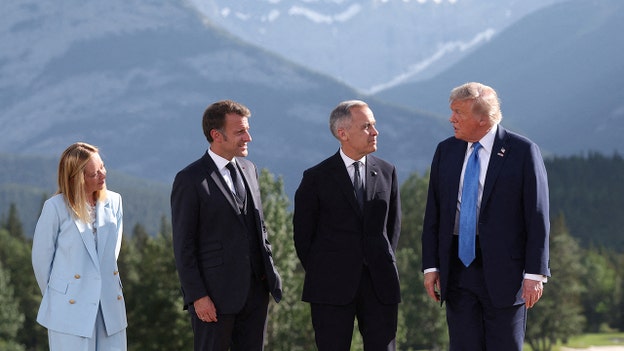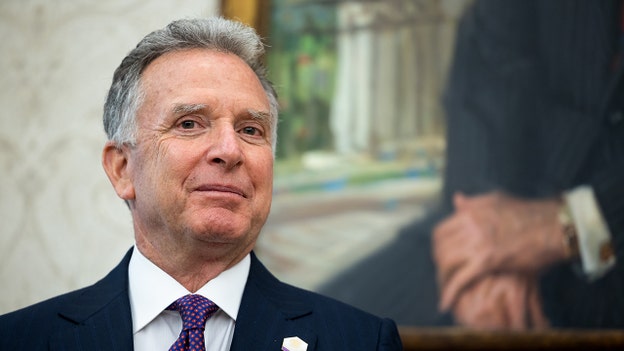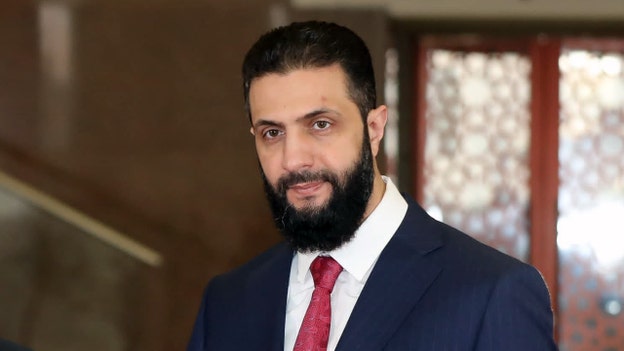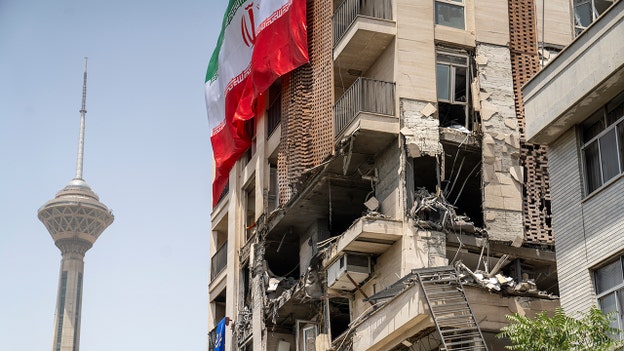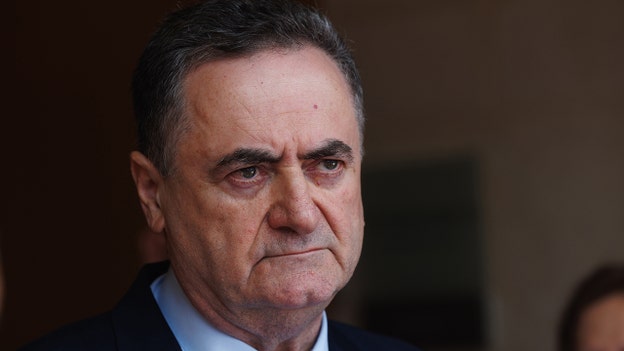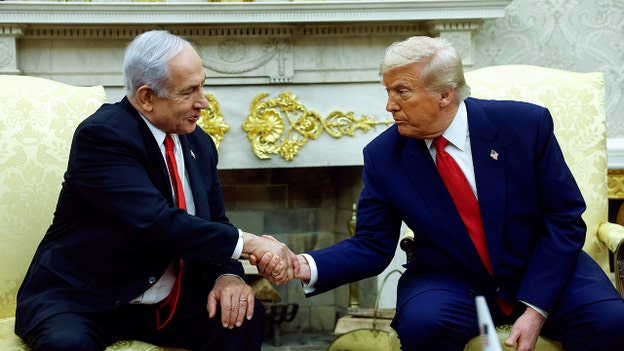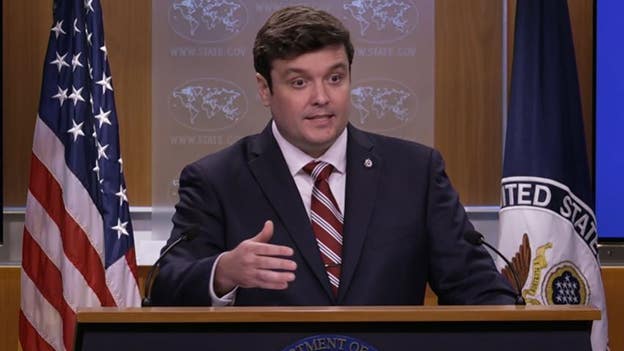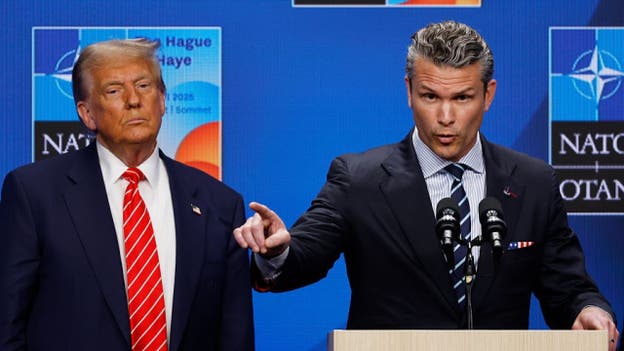UN atomic agency chief says Iran's nuclear program suffered 'enormous damage' in Trump strike
The head of the United Nations' Atomic Energy Agency said President Donald Trump's strike against Iran's nuclear program caused "enormous damage" to the country's progress on Thursday. Questions about the effectiveness of Saturday's attack had simmered throughout the week.
Coverage for this event has ended.
Macron: Trump ‘very determined’ to broker Gaza ceasefire
French President Emmanuel Macron said US President Donald Trump is “very determined” to broker a new ceasefire in Gaza, following a recent phone call between the two leaders.
Speaking Thursday at a press conference in Brussels after a meeting of EU leaders, Macron stressed Trump’s direct engagement in efforts to end the conflict.
“President Trump is very much aware of the importance of a ceasefire,” Macron said, referencing the US-brokered ceasefire earlier this week that brought an end to 12 days of fighting between Israel and Iran. He added, “I think his commitment is crucial on this issue.”
The two leaders also discussed the broader situation in the Middle East as well as the ongoing war in Ukraine, according to Macron’s office.
The Associated Press contributed to this report.
Hegseth dismisses claims Iran moved uranium before U.S. strikes: Not 'any intelligence' reviewed
At a Pentagon press briefing Thursday, U.S. Defense Secretary Pete Hegseth flatly rejected media speculation that Iran moved its enriched uranium stockpile before the U.S. struck nuclear targets over the weekend.
"I'm not aware of any intelligence that I've reviewed that says things were not where they were supposed to be, moved or otherwise," Hegseth said.
The response comes after some analysts, citing satellite photos from Maxar Technologies, claimed there was “unusual activity” outside Iran’s Fordow facility days before the strikes.
A senior Iranian source told Reuters uranium had been quietly relocated, a claim Hegseth says is not supported by any credible intelligence.
He also blasted the press for pushing a leaked low-confidence damage assessment that downplayed the success of the strike.
Citing updated CIA reports, Hegseth emphasized the Iranian nuclear program was “severely damaged” and will take years, not months, to rebuild.
Trump administration weighs $30 billion civilian nuclear deal with Iran: report
The Trump administration is considering offering Iran up to $30 billion in foreign-backed investment for a civilian nuclear energy program, but only if Tehran agrees to permanently halt all uranium enrichment, according to a CNN report cited by the Jerusalem Post.
While the U.S. would not fund the plan directly, officials are reportedly urging Gulf allies to cover the cost.
Under the proposal, Iran would adopt the “UAE model,” which prohibits domestic uranium enrichment and instead relies on importing nuclear fuel under strict international oversight, including full cooperation with the IAEA.
Discussions have reportedly included sanctions relief, the unfreezing of $6 billion in Iranian assets, and replacing the bombed Fordow site with a non-enrichment facility.
A key demand: Iran must abandon enrichment. U.S. Special Envoy Steve Witkoff is leading the push, aiming for a “comprehensive peace agreement.”
Talks are ongoing, but no final deal has been reached. Secretary of State Marco Rubio emphasized Iran must engage directly, not just via intermediaries.
Explosion 'literally looked like daylight:' Pentagon defends Iran strikes in briefing
A search is underway to identify and prosecute whoever leaked a preliminary, low-confidence intelligence assessment suggesting the U.S. strike on Iran's nuclear facilities merely delayed, rather than destroyed, Tehran’s program.
Defense officials showcased simulated footage of bunker buster bombs targeting Iran’s Fordow site, a plan 15 years in the making.
Six 30,000-pound bombs per B-2 stealth bomber were timed to detonate underground just feet off the floor.
“The pilot stated, quote, this was the brightest explosion that I’ve ever seen. It literally looked like daylight,” Joint Chief Chairman Caine recounted during the presser.
At Al Udeid Air Base, 44 U.S. soldiers operating two Patriot batteries intercepted 14 Iranian ballistic missiles.
General Caine praised their efforts: “Imagine you're that young First Lieutenant... you’re going to have approximately two minutes... to either succeed or fail.”
Despite lingering questions about Iran’s 440 kilograms of 60% enriched uranium, the Pentagon maintains it was not removed before the strike. Nuclear experts note the material is movable, but U.S. intelligence believes Tehran lacked the time and ability to relocate it safely.
Report: Syria quietly backed Israeli strikes on Iran to weaken rival, experts say
Citing strategic interests and regime survival, Syria’s interim President Ahmed al-Sharaa allowed Israeli aircraft to pass through Syrian airspace during Israel’s recent 12-day campaign against Iran, according to reporting by The Jerusalem Post.
Israeli military planes struck Iranian nuclear sites and military targets from Syrian skies without interference. Experts say the decision was intentional.
“Every blow to Iran is pure benefit to al-Sharaa's regime,” said Prof. Amatzia Baram of the University of Haifa. He explained that weakening Iran helps al-Sharaa consolidate power in Damascus, free from Tehran’s influence.
Baram also noted the lessons al-Sharaa likely took from the Israeli operation: the unprecedented reach and precision of Israeli airpower, and the depth of its intelligence capabilities eliminating high-value Iranian targets deep inside the country.
“If I were al-Sharaa, I would conclude that Israel can reach me at any moment,” Baram said.
The strikes, aimed at curbing Iran’s nuclear ambitions, also bolstered al-Sharaa’s position by deterring Shiite militias in Iraq and Hezbollah, who remained inactive during the conflict.
The new Syrian leader, Baram added, is “quietly grateful” for the Israeli operation that weakened his enemies.
Condoleezza Rice: Iran weakened, U.S. credibility strengthened after strikes
In an exclusive interview with "Special Report," former Secretary of State Condoleezza Rice praised the recent U.S. and Israeli strikes on Iran’s nuclear facilities as a “momentous moment” for the region.
Speaking with Bret Baier, Rice called the military campaign “extraordinary” and said the evidence strongly suggests Iran’s nuclear program was “substantially, significantly damaged.”
Rice criticized early low-confidence intelligence assessments suggesting minimal impact, calling such claims “irresponsible,” and emphasized that Iran’s regional influence through proxies like Hamas and Hezbollah had been dealt a serious blow.
“This really is a now crippled Iran, and a crippled Iran is good for the region,” she said, adding that the moment creates opportunities for countries like Iraq, Lebanon, and Syria, especially amid talk of Syrian leader Bashar al-Assad’s downfall.
On diplomatic prospects, Rice was skeptical: “We’ve had 46 years of the Iranians destabilizing the region. They don’t want peace.”
However, she left room for pressure via diplomacy, urging international actors like Russia to push Iran toward cooperation with the IAEA.
Rice also said the strikes reinforced American credibility globally. “This is a shot in the arm for American credibility, which I believe has been suffering since our disastrous withdrawal from Afghanistan.”
Asked if she would return to public service, Rice reiterated her retirement from government but said she remains committed to shaping future leaders as a professor at Stanford University.
Iran cracks down internally after ceasefire with Israel: report
Following its 12-day conflict with Israel, Iran has shifted its focus inward, launching a widespread crackdown on dissent across the country, particularly in Kurdish regions.
According to a report by Reuters, hundreds have been arrested on political or security charges since the airstrikes began on June 13. Iranian state media reported the execution of three men in Urmia near the Turkish border, all identified by rights groups as Kurdish.
Security forces have increased their presence in cities and along borders with Pakistan, Iraq, and Azerbaijan. Revolutionary Guard and Basij units have reportedly gone door-to-door searching for suspects, with checkpoints established and citizens subjected to phone and ID inspections.
Some schools in Kurdish areas have been turned into makeshift military outposts.
Officials told Reuters that Iran is now prioritizing internal stability and is especially concerned about opposition groups, ethnic separatists, and alleged Israeli agents. While no mass protests have emerged, activists say many are lying low, fearing further arrests.
The Iranian Human Rights Activists News Agency (HRNA) documented 705 arrests so far, and exiled Kurdish factions say more than 500 opposition members have been detained.
One activist in Tehran warned that the regime may use the war as “a pretext” for a broader clampdown.
IDF Chief calls Operation Rising Lion 'one of Israel’s most daring'
In a video message posted Thursday, IDF Chief of the General Staff LTG Eyal Zamir praised Operation Rising Lion as “one of Israel’s most daring and successful operations.”
The 12-day mission, aimed at confronting what he called an “existential threat,” struck Iran's nuclear and missile infrastructure and eliminated key operatives.
“We struck deep into Iran, setting back its military nuclear program, its ballistic missile capabilities, and eliminating those who led the efforts to destroy Israel,” Zamir said.
The general confirmed he remained in close coordination with U.S. military leaders, describing the U.S. and Israel's partnership as rooted in “common values” and a shared goal of regional stability.
Zamir argued that Operation Midnight Hammer, part of the broader Rising Lion campaign, unfolded over Tehran with precision, all while Israel remained alert on six other fronts.
Zamir concluded by declaring Israel’s ongoing mission: “Bringing home the 50 hostages still in Gaza, and dismantling Hamas.”
Israel didn’t know if U.S. would join Iran strikes, says Defense Minister Katz: report
In a revealing interview with Channel 12, Israeli Defense Minister Israel Katz acknowledged that Israel launched its military campaign against Iran without knowing whether the United States would join the offensive.
The remarks, reported by The Times of Israel, show the high-stakes uncertainty surrounding the early stages of the conflict.
“In defense, we knew they [the U.S.] were with us — and they did an amazing job,” Katz said, praising U.S. support once the operation was underway.
Katz also confirmed that while Israel does not know the exact locations of all of Iran’s enriched uranium stockpiles, its strikes were aimed at dismantling Tehran’s enrichment infrastructure. “The uranium itself, the material, was not a target for attack,” he noted.
Katz stated that Israel would have taken out Iran’s Supreme Leader Ayatollah Ali Khamenei “if he had been in our sights.”
Sen. Murphy criticizes Iran strikes, questions Trump’s claims of nuclear 'obliteration'
Speaking to reporters after a closed-door briefing on the Iran strikes, Sen. Chris Murphy, D-Conn., expressed strong skepticism about the effectiveness of President Trump’s military action, stating it only set back Iran’s nuclear program by “a handful of months.”
“This briefing should have happened immediately after these strikes,” Murphy said, questioning why the Director of National Intelligence wasn’t allowed to participate. “To me, it still appears that we have only set back the Iranian nuclear program by a handful of months.”
Murphy directly challenged President Trump’s earlier claims that the program had been “obliterated.”
“There’s no doubt there was damage… but the allegations that we have obliterated their program just don’t seem to stand up to reason,” he said.
When asked if he would have supported the operation had it come to Congress, Murphy responded firmly: “No… you cannot bomb knowledge out of existence.”
U.S. lifts travel restrictions to Al Udeid Air Base in Qatar
The U.S. Embassy in Doha has lifted all travel restrictions to Al Udeid Air Base, stressing a return to normal operations for embassy personnel and American citizens in Qatar.
According to a State Department announcement on Thursday, non-essential travel to the base is no longer discouraged, and previous cautionary guidance has been rescinded.
In a public advisory shared via X, the State Department’s travel account wrote, “Qatar: U.S. Embassy Doha has lifted all restrictions on travel to Al Udeid Air Base. Embassy personnel may resume normal access, and we no longer recommend limiting non-essential travel to the base. U.S. citizens in Qatar are advised that the previous cautionary guidance is no longer in effect."
Al Udeid, located southwest of Doha, is the largest U.S. military base in the Middle East and a key hub for American air operations in the region.
Israel’s Mossad offers telemedicine help to Iranians after war: 'We stand with you'
In a unique move, Israel’s Mossad intelligence agency offered direct medical assistance to Iranian civilians via telemedicine following the recent ceasefire between the two nations.
“Dear people of Iran… We stand with you,” the agency wrote in Farsi on social media, announcing a team of Israeli doctors, including specialists in cardiology, diabetes, oncology, and more, was ready to offer remote medical care.
The services are available in Persian and English via WhatsApp, Telegram, Signal, or phone.
As reported by TPS-IL, Israel's news agency, the outreach follows Israel’s June 13 strikes on Iranian nuclear facilities, citing Tehran’s rapid progress toward nuclear weapons.
The 12-day war ended after the U.S. brokered a ceasefire earlier this week.
Khamenei claims 'victory' after ceasefire, warns of future action
Iran’s Supreme Leader Ayatollah Ali Khamenei broke his silence following the 12-day war with Israel, downplaying the damage to Iran’s nuclear facilities and hailing what he called a successful strike campaign.
“We thank God for helping our armed forces to be able to penetrate their advanced multi-layered defenses and to put many of their urban and military areas under pressure… with a strong attack using our advanced weapons,” Khamenei said in remarks aired by Iranian state media.
While Iran's government claims the war ended in their favor, Israeli officials continue releasing video evidence of successful precision strikes, including on nuclear sites and IRGC commanders. Both Tel Aviv and Tehran have largely returned to normalcy.
Khamenei warned that Iran would “take action again if necessary,” as ceasefire talks continue in Gaza, where 50 hostages remain in Hamas captivity.
Trump accuses Democrats of Iran strike leak, says 'they should be prosecuted'
President Donald Trump is blaming Democrats for allegedly leaking details of the recent U.S. military operation against Iran’s nuclear sites.
“The Democrats are the ones who leaked the information on the PERFECT FLIGHT to the Nuclear Sites in Iran. They should be prosecuted!” Trump wrote on Truth Social Thursday.
The president’s post comes as scrutiny builds over how early operational details of “Operation Midnight Hammer” appeared in the press.
Trump, Netanyahu exploring post-war summit: report
President Donald Trump and Israeli Prime Minister Benjamin Netanyahu are in early talks to meet in the coming weeks, according to reporting from The Jerusalem Post.
While no date is set, both leaders are reportedly interested in a high-level meeting following the ceasefire with Iran. Sources told the Post the two sides see value in what one Israeli official called a potential “victory party.”
Key topics expected to be discussed include expanding the Abraham Accords and advancing a Gaza hostage deal. The Post also reports that the idea of exiling senior Hamas leaders from Gaza, long rejected, has returned to the table in ongoing talks.
Netanyahu said Thursday that Israel is seeking “a dramatic expansion of peace agreements,” signaling strong interest in coordinating next steps with the Trump administration.
State Department: U.S. Focused on Iran-Israel ceasefire, seeks 'longstanding peace'
At Thursday’s press briefing, Deputy State Department Spokesperson Tommy Pigott reiterated the Trump administration’s focus on the ceasefire between Iran and Israel, stressing U.S. support for Israel and the pursuit of regional peace under President Donald Trump’s leadership.
Pigott stated plainly: “Right now, what we're looking at is trying to get a ceasefire. That is our focus.”
He added, “Our focus now is the ceasefire. We need to see—our focus is getting to that ceasefire, standing with Israel's right to defend itself, its right to protect itself.”
When asked about upcoming diplomatic talks with Iran, Pigott confirmed the goal remains long-term peace: “Well, I refer you to my colleague Karoline [Leavitt]. She spoke about this, at the press briefing at the White House. One of the things that she said there was the goal of an Iranian meeting is to obtain longstanding peace in the region."
He declined to elaborate further, saying, “I have nothing further to add to her comments.”
WATCH: IDF releases new footage from Operation 'Rising Lion'
The Israel Defense Forces (IDF) has just released dramatic new footage showcasing Israeli Air Force operations during Operation Rising Lion, the recent campaign that played a central role in the Iran-Israel conflict.
The newly released video shows Israeli fighter jets taking off as part of the operation that struck Iranian military and nuclear assets earlier this month.
The Israeli Air Force played a key role in disabling Iranian radar systems, missile batteries, and defense infrastructure ahead of and during coordinated U.S.-Israeli strikes that culminated in what both governments are calling the most significant setback to Iran’s nuclear ambitions in history.
While the ceasefire now appears to be holding, Israeli leaders have made clear that any violation, particularly signs of renewed nuclear activity, will be met with swift military response.
White House reiterates that Trump does not want another 'endless war'
White House press secretary Karoline Leavitt emphasized once again that President Donald Trump does not want to drag the U.S. into an "endless war with Iran."
Her comments at Thursday's press briefing came in response to questions from a reporter who asked how long the Israel-Iran cease-fire will last, and about Americans who are worried that the U.S. is being pulled into another long-term conflict.
"I think the fact that the president was able to successfully negotiate a cease fire when nobody thought that was possible--it was a surprise to everyone in this room. It was a surprise to the world, but the president got it done because he wants to see peace in this world," Leavitt responded. "He does not want the United States to be dragged into these conflicts again. He's not afraid to use strength if he has to, but the president has already proven he can put America first and deliver on peace. At the same time, they're not mutually exclusive goals."
Leavitt says 'we were watching' Iran sites for weeks ahead of strikes, no indications uranium moved
White House press secretary Karoline Leavitt said the U.S. was monitoring Iran's nuclear facilities "for weeks" ahead of Saturday's strikes.
Leavitt made the comments during a Thursday press briefing, saying there was no indication that Iran moved its enriched uranium out of the facilities before Operation Midnight Hammer.
U.S. intelligence was "watching these sites very closely," Leavitt said, going on to call the operation "one of the most secretive and successful operations in United States history."
"I think many of you in this room would agree with that because none of you knew in this room about the strike on Saturday until it took place," she added.
'The mission was accomplished': Senate Republicans push back against leaked report on Iran strikes
Senate Republicans pushed back against a leaked report that President Donald Trump’s strikes on Iran did not obliterate the Islamic Republic’s nuclear program, but still wanted more information on the full extent of the damage done to the key facilities.
A widely reported "low confidence" assessment from the Defense Intelligence Agency (DIA) suggested that the weekend strikes, dubbed Operation Midnight Hammer, did not completely destroy Iran's nuclear capabilities.
Trump has remained firm that the sites were "totally obliterated," and the White House has strongly pushed back against the report. And both the Israeli and Iranian governments agree that the sites were badly damaged.
Members of the Senate Foreign Relations Committee and Senate Armed Services Committee told Fox News Digital that they were confident in the president’s assessment and pushed back against the DIA’s findings.
"First of all, one of the things I'd consider is the DIA said that Ukraine would be wiped out in three days," Sen. Kevin Cramer, R-N.D., told Fox News Digital. "And second, whatever the damage to Fordow is, the damage to the [nuclear] capabilities of Iran are devastating."
Cramer said that the effectiveness of the bombing, which was carried out by several B-2 bombers armed with bunker-busting bombs, could not be "overstated," and warned that lingering questions surrounding the effectiveness of the operation were just "fodder for political discussion."
"I think the mission was accomplished," he said.
Senate Armed Services Committee Chair Roger Wicker, R-Miss., had not yet read the report, but called the DIA’s finding and subsequent news reports "bogus." Wicker’s sentiment came just after Senate Republicans met behind closed doors with Israeli Ambassador Yechiel Leiter.
This is an excerpt from an article by Fox News' Alex Miller
Trump says pilots who executed 'Operation Midnight Hammer' were 'devastated' by media reaction
The American pilots who carried out Operation Midnight Hammer over Iran were "devastated" by the media's subsequent attempts to downplay the mission, President Donald Trump says.
Trump made the comments during a press appearance alongside Defense Secretary Pete Hegseth. Since the Saturday strike, prominent media outlets have highlighted a leaked "low confidence" report from a U.S. intelligence agency suggesting the mission only set back Iran's nuclear program a matter of months.
Hegseth tears into media for 'cheering' against Trump, Iran strikes
Secretary of Defense Pete Hegseth excoriated reporters at a Pentagon press briefing on Thursday, accusing them of rooting for the failure of President Donald Trump and the military’s recent strikes against Iran’s three key nuclear sites.
Hegseth addressed recent media reports citing a leaked low-confidence preliminary report from the Defense Intelligence Agency (DIA) that suggested U.S. strikes against Iran likely put the country back mere months.
"You, the press, specifically you, the press corps, because you cheer against Trump so hard," he said. "It's like in your DNA and in your blood to cheer against Trump because you want him not to be successful so bad. You have to cheer against the efficacy of these strikes. You have to hope maybe they weren't effective."
A DIA source previously told Fox News that the "low confidence" assessment was based on just "one day’s worth of intelligence reporting" and more intelligence has been gathered in the days since through other sources and methods.
Hegseth accused the press of misrepresenting the facts.
"Maybe the way the Trump administration is represented isn't true. So let's take half truths, spun information, leaked information, and then spin it," Hegseth said of the media. "Spin it in every way we can to try to cause doubt and manipulate the mind, the public mind, over whether or not our brave pilots were successful."
This is an excerpt of an article by Fox News' Stephen Sorace
Iran, Israel and US agree that Islamic Republic nuclear sites were 'badly damaged' despite leak
President Donald Trump’s historic precision strikes on Iran’s nuclear sites Saturday hit their targets and "destroyed" and "badly damaged" the facilities’ critical infrastructure — an assessment agreed upon by Iran’s Foreign Ministry, Israel and the United States.
"Our nuclear installations have been badly damaged, that’s for sure," Iran’s Foreign Ministry spokesman Ismail Baghaei told Al Jazeera.
Israel’s Defense Forces Chief of Staff Lt. Gen. Eyal Zamir said its assessment is that Iran’s nuclear program has been "significantly damaged," while Israel’s Atomic Energy Commission described the U.S. strikes as "devastating."
"The devastating U.S. strike on Fordow destroyed the site’s critical infrastructure and rendered the enrichment facility inoperable," Israel’s Atomic Energy Commission said. "We assess that the American strikes on Iran’s nuclear facilities, combined with Israeli strikes on other elements of Iran’s military nuclear program, has set back Iran’s ability to develop nuclear weapons by many years."
It added: "The achievement can continue indefinitely if Iran does not get access to nuclear material."
And as for the United States, Chairman of the Joint Chiefs of Staff Dan "Razin" Caine said that initial battle damage assessments indicate that "all three sites sustained extremely severe damage and destruction."
"More than 125 U.S. aircraft participated in this mission, including B-2 stealth bombers, multiple flights of fourth and fifth generation fighters, dozens and dozens of air refueling tankers, a guided missile submarine, and a full array of intelligence, surveillance, and reconnaissance aircraft, as well as hundreds of maintenance and operational professionals," Caine said in a press briefing.
This is an excerpt from an article by Fox News' Brook Singman
Russian official says Moscow has 'no intention' of supplying Iran with warheads after Trump taunts
Former Russian President Dmitry Medvedev said that Moscow is not planning to supply Iran with nuclear warheads, after President Donald Trump mocked him for suggesting that other countries would step in and provide Iran with nuclear weapons after the U.S. strikes against Iranian nuclear facilities.
Medvedev, now the deputy chairman of the Security Council of Russia, originally said Sunday that Iran would continue to advance its nuclear program and would receive assistance from other nations to do so.
Although Medvedev did not specify any countries, he clarified later Monday that he was not talking about Russia.
"I condemn the U.S. strike on Iran — it failed to achieve its objectives," Medvedev said in a Monday post on X. "However, Russia has no intention of supplying nuclear weapons to Iran because, unlike Israel, we are parties to the Nuclear Non-Proliferation Treaty."
"I know quite well what this would entail, having overseen our nuclear forces as president," Medvedev said. "But other countries might — and that’s what was said."
Medvedev’s statement came after Trump called him out by name in a post on Truth Social following the Russian leader’s original Sunday remarks.
This is an excerpt from an article by Fox News' Diana Stacy
College campuses could be ground zero for Iranian sleeper cells plotting to harm Americans: experts
As the threat of Iranian retaliation looms, the potential for terror proxies to leverage new-age methods remains front of mind for experts pointing to antisemitic campus protests and social media propaganda as possible methods of creating chaos within the United States.
After strikes on Iran’s key nuclear sites by U.S. forces Saturday, the Department of Homeland Security (DHS) issued a National Terrorism Advisory System Bulletin warning of the heightened risk of domestic terrorism from Iranian-backed or domestic attackers.
"The likelihood of violent extremists in the Homeland independently mobilizing to violence in response to the conflict would likely increase if Iranian leadership issued a religious ruling calling for retaliatory violence against targets in the Homeland," the bulletin says.
Sleeper cells are groups planted within a country by a foreign government to live and work among citizens with the ultimate goal of eventually carrying out a terror attack or politically motivated act of violence.
Due to depleted funding and resources, terror organizations such as Hezbollah and Hamas have been forced to "sit this one out" when it comes to aiding Iran in its attacks, significantly depleting the regime’s show of force when looking to retaliate against the U.S. and Israel, according to Barak Seener, a senior fellow at the Henry Jackson Society.
This is an excerpt from an article by Fox News' Brooke Singman
Jack Keane praises Hegseth, joint chiefs chairman for 'remarkable' press briefing on Iran
Fox News senior strategic analyst Jack Keane joined "Fox & Friends" to discuss the Pentagon's press briefing regarding Operation Midnight Hammer on Thursday.
Keane, a retired four-star general, said the briefing was "one of the most remarkable" Pentagon press briefings he had ever seen.
"The secretary [of defense] obviously very passionate and frustrated with the misrepresentation by the media of the results of that operation," Keane said. "I haven't seen anything quite like that since Don Rumsfeld was secretary of defense and at times he would take issue with the media."
Keane went on to commend Joint Chiefs Chairman Gen. Dan Caine for "giving life" to the operation with his section of the briefing by highlighting the individuals involved and the difficulty of their roles.
Trucks seen at Iran's Fordow site were concrete workers, not moving nuclear material: Trump
President Donald Trump says the vehicles seen collected outside Iran's Fordow nuclear facility were concrete workers and not a group attempting to transport nuclear material.
Trump made the statement on social media Thursday amid speculation that Iran's enriched uranium may have been moved out of the Fordow facility prior to the U.S. strike on Saturday.
"The cars and small trucks at the site were those of concrete workers trying to cover up the top of the shafts. Nothing was taken out of facility. Would take too long, too dangerous, and very heavy and hard to move!" Trump wrote on Truth Social.
Pentagon tracked Iranian Fordow site since 2009 before targeting ventilation shafts, officials say
Pentagon officials say the U.S. military had been tracking Iran's Fordow nuclear facility since 2009 before launching Saturday's strike targeting the site's ventilation shafts.
Joint Chiefs Chairman Gen. Dan Caine made the revelation during a Thursday press conference, telling reporters that the military had developed weapons for the specific purpose of penetrating Fordow.
Caine said the Defense Threat Reduction Agency (DTRA) had been monitoring Fordow's construction since 2009, with a pair of officers noting "the weather, the discard material, the geology, the construction materials, where the materials came from," and other details.
"They literally dreamed about this target at night when they slept," Caine said of the DTRA team. "They thought about it driving back and forth to work. And they knew from the very first days what this was for. You do not build a multilayered underground bunker complex with centrifuges and other equipment in a mountain for any peaceful purpose."
"Along the way, they realized we did not have a weapon that could adequately strike and kill this target. So they began a journey to work with industry and other tacticians to develop the GBU 57," he said.
"Yesterday, I had the incredible honor and privilege of spending time with these two Defense Threat Reduction Agency officers who've given so much," Caine continued. "One of them said, quote, 'I can't even get my head around this. My heart is so filled with the pride of being a part of this team. I am so honored to be a part of this.'"
Joint Chiefs chairman details how US thwarted Iranian attack on Al-Udeid Air Base
Joint Chiefs Chairman Gen. Dan Caine detailed how roughly 44 U.S. servicemembers shut down Iran's attack on Al-Udeid Air Base following the U.S. strike in Iran's nuclear program Thursday.
Caine appeared for a press conference alongside Defense Secretary Pete Hegseth amid media criticism of the nuclear sites strike.
"We believe that this is the largest single Patriot engagement in U.S. military history," Caine said.
Caine said American troops manning the Patriot Missile batteries had just two minutes to execute their roles as Iranian missiles flew toward the base.
He added that Al-Udeid moved most of its occupants off of the base ahead of the attack in order to minimize any potential casualties. He said the oldest servicemember involved in the base's defense was 28, and the youngest was 21.
"These awesome humans, along with there Qatari brothers and sisters in arms, stood between a salvo of Iranian missiles and the safety of Al-Udeid," Caine said. "They are the unsung heroes of the 21st century United States Army."
Hegseth tears into reporters, alleging they 'cheer against Trump' and Iran strikes
Defense Secretary Pete Hegseth lashed out at reporters for "cheering" against President Donald Trump's administration to the detriment of American servicemembers on Thursday.
"You, the press, specifically you, the press corps, because you cheer against Trump so hard. It's like in your DNA and in your blood to cheer against Trump because you want him not to be successful so bad. You have to cheer against the efficacy of these strikes. You have to hope maybe they weren't effective. Maybe the way the Trump administration is represented isn't true. So let's take half truths, spun information, leaked information, and then spin it. Spin it in every way we can to try to cause doubt and manipulate the mind, the public mind, over whether or not our brave pilots were successful," Hegseth said.
He then criticized the lack of stories in the media about how difficult it was for American servicemembers to carry out Saturday's strike as well as defend Al-Udeid Air Base from Iran's counterattack.
"How many stories have been written about how hard it is? I don't know, fly a plane for 36 hours? ... Have we done it 2 or 3 times? So the American people understand how difficult it is?" he said.
"What's really happening is you're undermining the success of incredible B-2 pilots and incredible F-35 pilots and incredible refueling and incredible air defenders who accomplished their mission, set back a nuclear program in ways that other presidents would have dreamed," he added.
Hegseth says reporters miss 'historic moments' while 'searching for scandals'
Defense Sec. Pete Hegseth rebuked the media coverage of the U.S. strike on Iran's nuclear program on Thursday, saying reporters are merely "searching for scandals."
"Whether its fake news CNN, MSNBC or the New York Times, there has been fawning coverage of a preliminary assessment from the DIA," Hegseth said, noting that the organization rated it as "low confidence."
The leaked DIA report had suggested the Iran program was only set back months by the strike. Hegseth then referenced several other groups that disagreed, including Israel's atomic energy agency, which said Iran's Fordow facility had been rendered "inoperable."
Hegseth also noted the International Atomic Energy Agency said the strike caused "enormous damage."
"Time and time again, I can go down the list... those that do proper assessments recognize that what the United States military did was historic," he said.
"You, the press, specifically you, the press corps, because you cheer against Trump so hard. It's like in your DNA and in your blood to cheer against Trump because you want him not to be successful so bad. You have to cheer against the efficacy of these strikes. You have to hope maybe they weren't effective," he added.
Defending the 'Dignity of Our Great American Pilots' expected to be the focus of Hegseth presser
Secretary of Defense Pete Hegseth and Chairman of the Joint Chiefs of Staff Air Force General Dan Caine are expected to correct false media narratives regarding the U.S. strike mission in Iran this morning.
“Secretary of Defense (War!) Pete Hegseth, together with Military Representatives, will be holding a Major News Conference tomorrow morning at 8 A.M. EST at The Pentagon, in order to fight for the Dignity of our Great American Pilots," wrote President Trump.
"These Patriots were very upset! After 36 hours of dangerously flying through Enemy Territory, they landed, they knew the Success was LEGENDARY, and then, two days later, they started reading Fake News by CNN and The Failing New York Times. They felt terribly!"
President Trump then referred to media reports on the strike as 'fake news,' adding "fortunately for them and, as usual, solely for the purpose of demeaning PRESIDENT DONALD J. TRUMP, the Fake News (Times and CNN) lied and totally misrepresented the Facts, none of which they had (because it was too soon, there were no Facts out there yet!). The News Conference will prove both interesting and irrefutable. Enjoy!”
The event comes amid ongoing backlash against early media reports that questioned the effectiveness of the strikes.
Fox News' Liz Friden contributed to this report.
Iran supreme leader's account claims victory over US in first post since nuclear site strikes
The X account for Iranian Supreme Leader Ali Khamenei broke silence for the first time since President Donald Trump ordered strikes on Iran's nuclear program Thursday.
The post claimed Iran's retaliatory missile attack on Al-Udeid Air Base in Qatar had done "damage" and was a "heavy slap" to the U.S.
Both the U.S. and Qatar say Iran's missile strike was ineffective, with all of the missiles either missing the target or being shot down.
Khamenei has officially remained in hiding throughout the conflict with Israel and the U.S., with the New York Times reporting that he has cut off electronic communication with all of his commanders.
Iran atomic chief backs trump on Iran strike, says nuclear program suffered 'enormous damage'
The head of the United Nations' atomic agency stopped short of saying Iran's nuclear program had been "annihilated" on Thursday, but confirmed the U.S. strike had caused "enormous damage."
International Atomic Energy Agency chief Rafael Grossi made the statement during an interview on a French radio program.
“I think that annihilated is too much. But it has suffered enormous damage,” Grossi said. “There is very, very, very considerable damage.”
Grossi confirmed his belief that any centrifuges that were installed at Iran's Fordow nuclear site during the strike were certainly destroyed.
Hegseth to hold 'irrefutable' press conference defending Iran strike effectiveness, Trump says
Defense Sec. Pete Hegseth will hold a press conference Thursday morning explaining the Trump administration's position on a preliminary leaked report that downplayed the effectiveness of Saturday's strikes against Iran's nuclear program.
President Donald Trump announced Hegseth's "irrefutable" briefing on Wednesday, also pointing to Israeli and Iranian statements saying the effect of the strikes had been devastating and set back Iran's nuclear program by a measure of years. The leaked report, which the investigating agency gave a rating of "low confidence," suggested the nuclear program had only been set back a matter of months.
Hegseth said on Wednesday that the FBI and the Pentagon have opened investigations into how the preliminary report leaked.
Some experts remain skeptical of the setback, however, as a large convoy of trucks was seen at Iran's Fordow nuclear site just days before the U.S. strike.
Daryl Kimball, a nuclear arms control expert, told Fox News on Wednesday that Iran moved 440 kg of 60% enriched uranium from Fordow. “They have moved it. And the IAEA has said they don’t know where it is,” Kimball warned. “That’s a problem.”
Fox News' Jennifer Griffin contributed to this report
Live Coverage begins here
